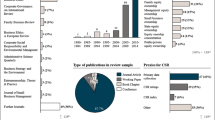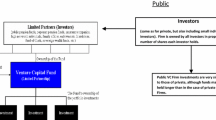Abstract
We find that agency problems are embedded in firm’s excess and abnormal equity investments that are mainly dictated by controlling shareholder’s motives and ethical choices manifested in ownership and board structure. The excess equity investment is gauged with respect to industry average. The abnormal equity investment is specifically referred to the number of nominal investment companies that are fully controlled by the controlling owners while subject to little governance. Our empirical evidences of 345 Taiwanese non-financial listed firms show that firm’s excess and abnormal equity investments are negatively correlated with controlling shareholder’s cash flow rights while are positively correlated with the control–cash flow deviation, and board affiliation. The results are supportive of the positive incentive hypothesis and the negative entrenchment hypothesis put forth by La Porta et al. (2002, Journal of Finance 57, 1147–1171) and Claessen et al. (2002, Journal of Finance 57, 2741–2742). The negative relation between equity investment and firm’s value further supports the agency postulation that corporate excess and abnormal equity investments represent a leeway for controlling shareholder to exploit wealth of minority shareholders. This study potentially contributes to the literature of business ethics by portraying an empirically testable linkage from controlling owner’s ethical choices to his actions and therefore firm’s value.
Similar content being viewed by others
References
Bebchuk L., R. Kraakman, and G. Triantis, 2000, ‚Stock Pyramids, Cross-Ownership, and Dual Class Equity: The Creation and Agency Costs of Separating Control from Cash Flow Rights’, in Randall K. Morck (ed.), Concentrated Corporate Ownership, NBER Conference Report Series, University of Chicago Press, Chicago
Chandler A. D., 1977, The Visible Hand Belknap Press Cambridge, MA
Cho M. H., 1998, Ownership Structure, Investment and the Corporate Value: An Empirical Analysis Journal of Financial Economics 47: 103–121
Claessens S., S. Djankov, L. H. P. Lang, 2000, The Separation of Ownership and Control in East Asian Corporation Journal of Financial Economics 58: 81–112
Claessens S., S. Djankov, J. Fan, H. P. Lang, 2002, Disentangling the Incentive and Entrenchment Effects of Large Shareholdings Journal of Finance 57: 2741–2742
Craswell A. T., S. L. Taylar, R. A. Saywel, 1997, Ownership Structure and Corporate Performance: Australian Evidence Pacific-Basin Finance Journal 5: 301–323
Faccio M., L. H. P. Lang, 2002, The Ultimate Ownership in Western European Corporations Journal of Financial Economics 65: 365–395
Grossman S., O. Hart, 1988, One-Share, One-Vote, and the Market for Corporate Control Journal of Financial Economics 20: 175–202
Hoffman J. J., G. Couch, B. T. Lamont, 1998, The Effect of Firm Profit Versus Personal Economic Well-Being on the Level of Ethical Responses Given by Managers Journal of Business Ethics 17(3): 239–244
Johnson S., P. Boone, A. Breach, E. Friedman, 2000, Corporate Governance in the Asian Financial Crisis Journal of Financial Economics 58: 141–186
La Porta R., F. Lopez-de-Silanes, A. Shleifer, R. Vishny, 1998, Law and Finance Journal of Political Economy 106: 1113–1155
La Porta R., F. Lopez-de-Silanes, A. Shleifer, 1999, Corporate Ownership around the world Journal of Finance 54: 471–517
La Porta R., F. Lopez-de-Silanes, A. Shleifer, R. Vishny, 2000, Investor Protection and Corporate Governance Journal of Financial Economics 58: 3–27
La Porta R., F. Lopez-de-Silanes, A. Shleifer, R. W. Vishny, 2002, Investor Protection and Corporate Valuation Journal of Finance 57: 1147–1171
Lang L. H. P., R. M. Stulz, 1994, Tobin’s Q, Corporate Diversification and Firm Performance Journal of Political Economy 102: 1248–1280
Lehn K., J. Netter, A. Poulsen, 1990, Consolidation Corporate Control: Dual Class Recapitalisations versus Leverage Buyout Journal of Financial Economics 27: 347–376
Lemmon M. L., K. V. Lins, 2003, Ownership Structure, Corporate Governance, and Firm Value: Evidence from the East Asian Financial Crisis Journal of Finance 58: 1445–1468
Lewellen W. G., 1971, A Pure Financial Rationale for the Conglomerate Merger Journal of Business 54: 1–32
Majd S., S. C. Myers, 1987, Tax Asymmetries and Corporate Income Tax Reform In: M. Feldstein (ed.), Effects of Taxation on Capital Accumulation University of Chicago Press Chicago, IL
McConnell J., H. Servaes, 1990, Additional evidence on equity ownership and corporate value Journal of Financial Economics 27: 595–613
Morck R., A. Shleifer, R.W. Vishny, 1988, Management Ownership and Market Valuation: An Empirical Analysis Journal of Financial Economics 20: 293–315
Morris S. A., 1997, Internal Effects of Stakeholder Management Devices Journal of Business Ethics 16: 413–424
Myers S. C., 1977, The Determinants of Corporate Borrowing Journal of Financial Economics 5: 147–175
Navran F., 1997, Are You Employees Cheating to Keep Up? Workforce 76(8): 58–61
Rieck D., 1998, Balancing Ethics and Profitability Direct Marketing 61(6): 53–56
Shleifer, A. and R. Vishny: 1986, ‘Large Shareholders and Corporate Control’, Journal of Political Economy 94: 461–488
Stulz R. M., 1990, Managerial Discretion and Optimal Financing Policies Journal of Financial Economics 26: 3–27
Verschoor C. C., 1998, A Study of the Link between a Corporation’s Financial Performance and its Commitment to Ethics Journal of Business Ethics 17(13): 1509–1516
Weston J. F., 1097, The Nature and Significance of Conglomerate Firms St John’s Law Review 44: 66–80
Wu C. F., 2002, The Relationship of Ethical Decision-Making to Business Ethics and Performance in Taiwan Journal of Business Ethics 35: 163–176
Yeh Y. H., T. Woidtke, 2005, Commitment or Entrenchment? Controlling Shareholders and Board Composition Journal of Banking and Finance 29: 1857–1885
Zadek S., 1998, Balancing Performance-Ethics and Accountability Journal of Business Ethics 17(13): 1421–1441
Acknowledgment
We are very grateful to the anonymous referees for their insightful suggestion that greatly improved this␣article and Ming-Chien Lin for excellent research assistance. We would like to thank the helpful comments from Alex Michalos and Joanna K. C. Lam, and the participants of the World Business Ethics Forum (2006, Hong Kong and Macau). The authors would also like to thank the National Science Council of R.O.C. for financially supporting this research under Contract No. NSC 91-2416-H-030-007. Any remaining errors are our own.
Author information
Authors and Affiliations
Corresponding author
Additional information
Yin-Hua Yeh, Ph.D., is Professor and Director of the Graduate Institute of Finance at Fu-Jen Catholic University (FJU) in Taiwan. He is also the Director of the Center for Corporate Governance and Business Ethics at FJU. His main research and teaching areas are corporate governance, corporate finance, and merger and acquisition.
Tsun-Siou Lee, Ph.D., is Professor of Finance at National Taiwan University. His main research and teaching areas are corporate governance, futures and options, and financial innovation.
Pei-Gi Shu, Ph.D., is Professor of Business Administration at Fu-Jen Catholic University in Taiwan. He is also the Vice Dean of Management College at FJU. His main research and teaching areas are mutual funds and behavioral finance.
Rights and permissions
About this article
Cite this article
Yeh, YH., Lee, TS. & Shu, PG. The Agency Problems Embedded in Firm’s Equity Investment. J Bus Ethics 79, 151–166 (2008). https://doi.org/10.1007/s10551-007-9387-3
Published:
Issue Date:
DOI: https://doi.org/10.1007/s10551-007-9387-3




